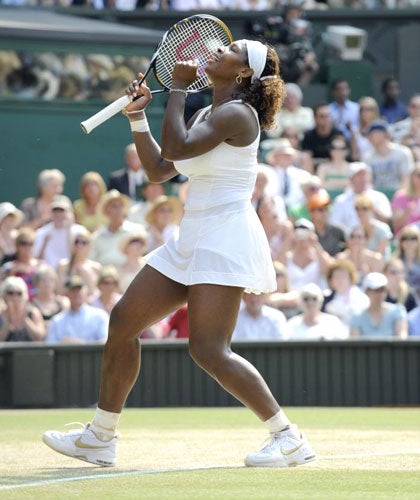Serena is pushed to limit on way to final
Venus cruises past world No 1 while her sister clinches SW19's longest women's semi

Your support helps us to tell the story
From reproductive rights to climate change to Big Tech, The Independent is on the ground when the story is developing. Whether it's investigating the financials of Elon Musk's pro-Trump PAC or producing our latest documentary, 'The A Word', which shines a light on the American women fighting for reproductive rights, we know how important it is to parse out the facts from the messaging.
At such a critical moment in US history, we need reporters on the ground. Your donation allows us to keep sending journalists to speak to both sides of the story.
The Independent is trusted by Americans across the entire political spectrum. And unlike many other quality news outlets, we choose not to lock Americans out of our reporting and analysis with paywalls. We believe quality journalism should be available to everyone, paid for by those who can afford it.
Your support makes all the difference.If this is what women's tennis is like in the doldrums, what are they going to come up with when it is finally deemed worth watching?
Yet again, the ladies' title will be settled between the Williams sisters. News of their inexorable progress through the semi-finals yesterday will be received as further evidence of stagnation on the women's tour. When, it will be asked, will some young miss emerge with the game to stop so many mismatches?
Well, not so fast. True, there was something verging on the sadistic about the way Venus eviscerated Dinara Safina in just 51 minutes, 6-1, 6-0. But the epic resistance of Elena Dementieva forced Serena to limits that can seldom have been explored even by the greatest female players of the past.
At two hours 49 minutes, this became the longest women's semi-final in Wimbledon history. And in pulling the match out of the fire, 6-7, 7-5, 8-6, Serena offered a humbling reproof to the many who have become complacent at the siblings' mastery.
It often seems as though Serena and Venus are somehow held accountable for the failings of others. Some resent the introduction of the LA "street" to these suburban lawns; others, in contrast, the "dilettante" streak they detect in their prudent career management. Here, however, was a single, steaming afternoon that renewed a due sense of privilege at Centre Court.
Safina, remember, is formally the world No 1, and has just made successive Grand Slam finals, but should have been charged admission here. On the other hand her compatriot, Dementieva, showed that these terrifying standards can also exalt even a player whose potential at this level had apparently been exhausted by 43 Grand Slam failures.
She was magnificent. After winning an Olympic gold last year, she has discovered unprecedented consistency and belief at 27. Both women landed running, exchanging immediate breaks of serve, but the Russian held her nerve to win five points at 0-40 in the eighth game, and bossed the tie-break. In the second set, she was again broken straightaway, but her returns and groundstrokes remained so assured that she broke Serena to love in the sixth game, and then salvaged break point in the next game with a 110 mph second serve.
The abyss ostensibly dividing the two players was then expressively reduced to a bare millimetre. At 3-4, 30-40, Serena disputed a call that would have left Dementieva serving for the match – and Hawk-Eye disclosed perhaps one blade of grass to vindicate her challenge. Then, when Dementieva in turn found herself facing break point at 5-5, the close-up was again required to establish that a net-cord had spilled wide.
Serena served out, setting up a decider in which both women produced breathtaking tennis. It was desperate, unflinching stuff. Every other shot was pounded onto paint. And none would have felt the slightest injustice had Dementieva seized the first match point, instead of allowing her opponent a fatal opportunity at the net. Serena would not permit her a second chance.
"The only regret I have is that I should have taken more of a risk then," Dementieva said afterwards. "I should have gone down the line. That was definitely my best match on grass. It was a real fight from beginning to end. I wasn't sure if it was Serena or Andy Roddick on the other side, it was a huge percentage on her first serve. Even with that I was able to break her a couple of times. She's a fighter. Me, too. I did believe in myself."
Serena reflected that her forehand had gone "to Hawaii" for the day and had survived on her serve. "It's always good to win when one of your strokes is on vacation," she said. "
It was impossible not to feel pity for her victim, as she gave a fragile smile. Yet it was perfectly possible, despite the evidence of the other semi-final, to believe her as she pondered her own Grand Slam future. "I don't think it was my best chance," she said. "I don't think it was the last chance."
Safina, in contrast, cut a pathetic figure. You sensed a damaging legacy for her own mental outlook – but not, thanks to all three of the other semi-finalists, for those she somehow bestrides in the rankings.
Join our commenting forum
Join thought-provoking conversations, follow other Independent readers and see their replies
Comments